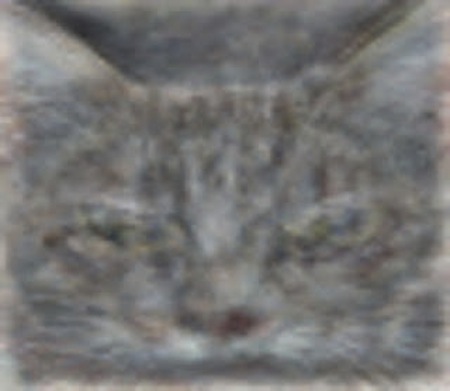Eureka! It’s a Cat!

In our current top story, William Dembski observes that a materialist-evolutionist like Daniel Dennett needs intelligence to be reducible to a dumb uncomprehending mechanism. Dennett confidently awaits the atheist millennium when the mystery of the human brain will be no more, but researchers at Google and Stanford have just given a concrete lab-tested indication of how very far off that prospect actually lies.
The research team tried to teach a computer network to recognize cat faces and human body parts. And they succeeded, but the extremely limited extent of their success is telling.
The purpose was to teach machines to recognize unlabeled shapes, whereas up till now computers have shown much more aptitude for sorting and shuffling labels and using those to sort and retrieve the shapes. The experiment required three days and 1000 machines, representing 16,000 cores, which were “trained” by showing them images from YouTube, millions in total. The Google/Stanford team summarizes:
Contrary to what appears to be a widely held intuition, our experimental results reveal that it is possible to train a face detector without having to label images as containing a face or not. Control experiments show that this feature detector is robust not only to translation but also to scaling and out-of-plane rotation. We also find that the same network is sensitive to other high-level concepts such as cat faces and human bodies. Starting with these learned features, we trained our network to obtain 15.8% accuracy in recognizing 20,000 object categories from ImageNet, a leap of 70% relative improvement over the previous state-of-the-art.
Notice that this “artificial brain” did not learn to recognize a particular cat’s face but — with 15.8% accuracy — that a random object was the face of a cat, any cat. Again, for that extraordinarily modest result, compared to what a human brain can do, the network required 1000 machines and three days.
Dennett can go on expecting the day when “every triumph of human thought has been matched or surpassed by ‘mere machines.'” But don’t you go holding your breath.
Image: Google.
